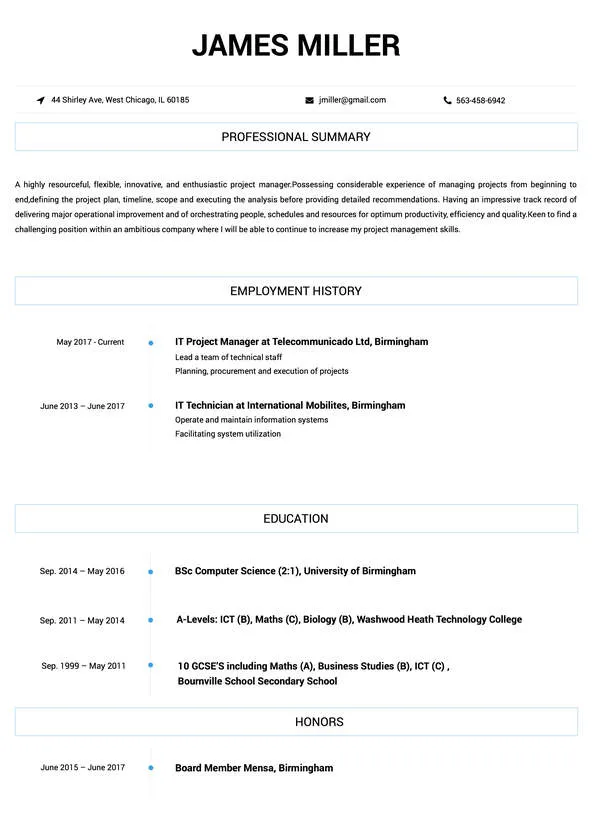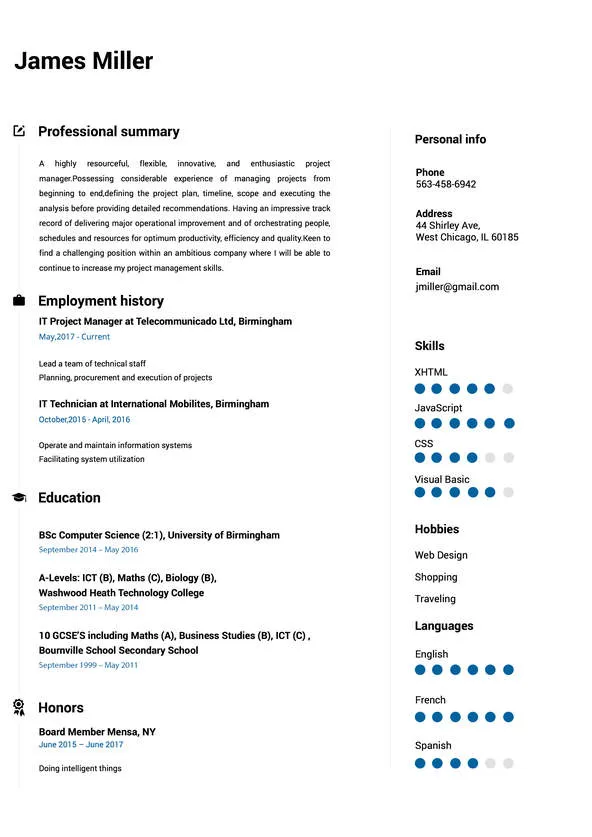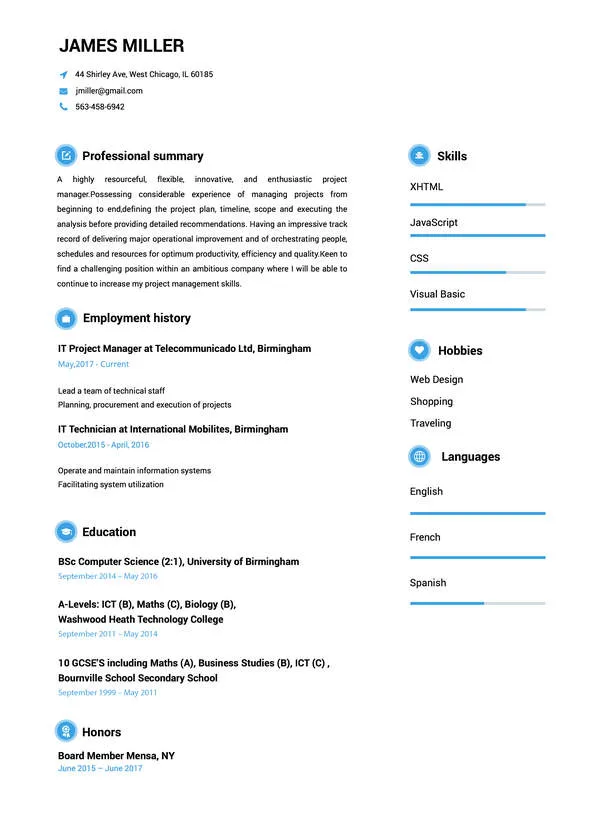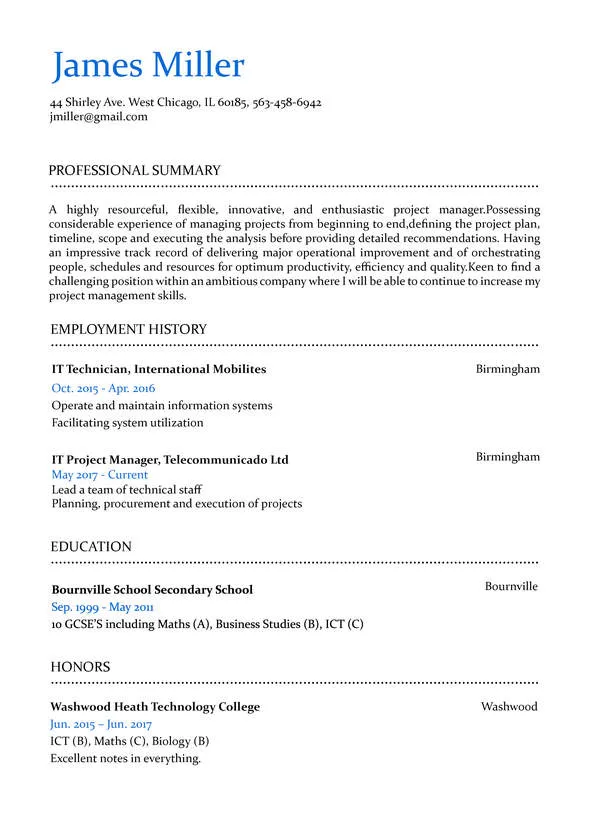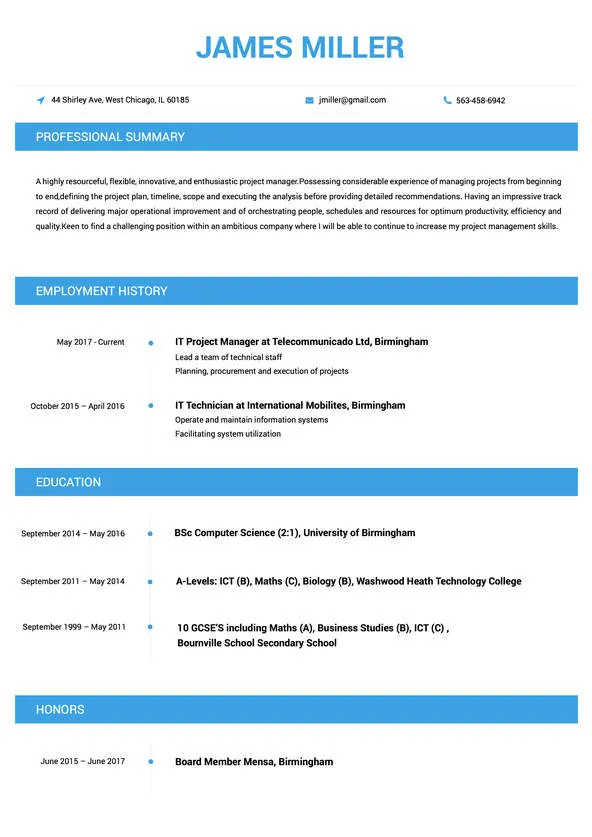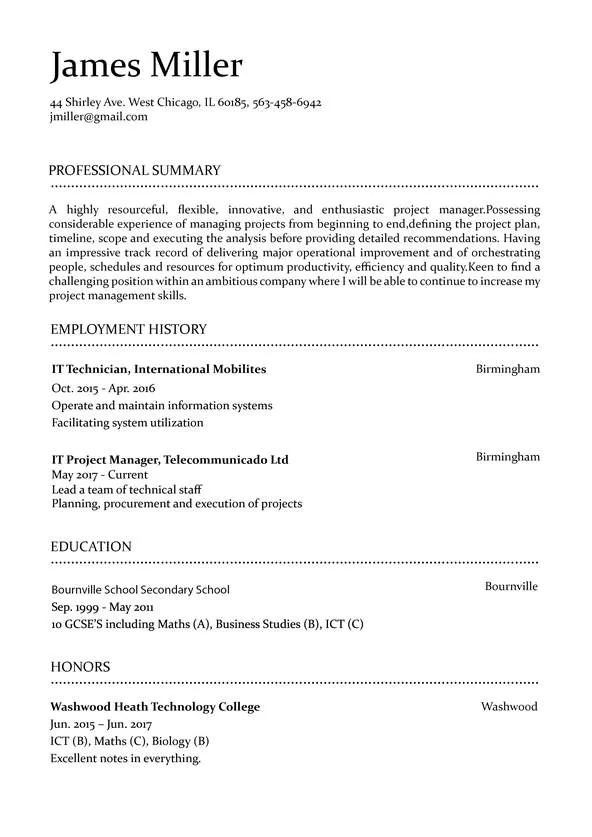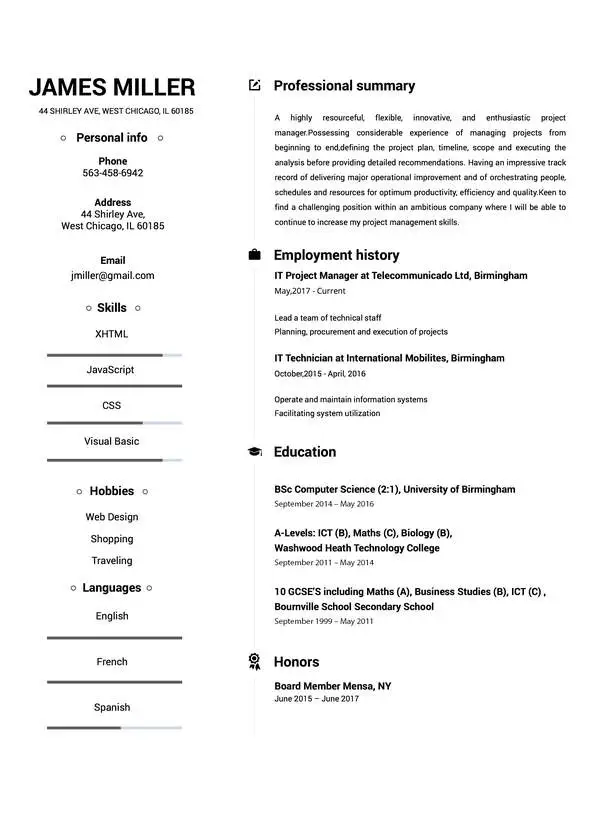 Use This Template
Use This Template
Build your resume in 15 minutes
Create an awesome resume that meets the expectations of potential employers with our selection of professional, field-tested resume templates.
software engineer: Resume Samples & Writing Guide
Professional Summary
Employment history
- Troubleshoot and debug software applications
- Develop and implement automation processes
- Work with cross-functional teams to ensure quality software releases
- Develop and implement automation processes
- Test and document software solutions
- Identify and address system performance issues
- Develop and implement automation processes
- Work with cross-functional teams to ensure quality software releases
- Design, develop, and maintain software applications
Education
Skills
Do you already have a resume? Use our PDF converter and edit your resume.
Employment history
- Develop and maintain software coding standards
- Develop and maintain technical documentation
- Collaborate with internal teams to develop software solutions
- Develop and implement automation processes
- Identify and address system performance issues
- Implement software solutions
- Test and document software solutions
- Implement software solutions
- Monitor system performance and troubleshoot issues
Education
Skills
Employment history
- Analyze user requirements and develop software solutions
- Monitor system performance and troubleshoot issues
- Work with cross-functional teams to ensure quality software releases
- Monitor system performance and troubleshoot issues
- Design, develop, and maintain software applications
- Analyze user requirements and develop software solutions
- Work with cross-functional teams to ensure quality software releases
- Implement security measures to protect data
- Test and document software solutions
Education
Skills
Professional Summary
Employment history
- Test and document software solutions
- Research and recommend software upgrades
- Implement security measures to protect data
- Analyze user requirements and develop software solutions
- Implement security measures to protect data
- Identify and address system performance issues
- Test and document software solutions
- Develop and maintain software coding standards
- Provide technical support for software applications
Education
Skills
Professional Summary
Employment history
- Implement software solutions
- Develop and implement automation processes
- Provide technical support for software applications
- Develop and maintain technical documentation
- Implement security measures to protect data
- Collaborate with internal teams to develop software solutions
- Collaborate with internal teams to develop software solutions
- Monitor system performance and troubleshoot issues
- Analyze user requirements and develop software solutions
Education
Skills
Not in love with this template? Browse our full library of resume templates
The proliferation of technology in recent years has led to software engineering becoming one of the most in-demand professions in the workplace. Software engineers are responsible for everything from developing apps, software, and games, to maintaining and optimizing existing technology systems
Considering how much value they provide to a large variety of companies, it comes as no surprise that the Bureau of Labor Statistics projects that employment of software developers will grow 21 percent from 2018 to 2028. This is a significantly faster rate than the average projected growth for all occupations, which sits at only 5 percent. This is great news for software engineers, right?
Well, on one hand, more jobs mean more employment opportunities. On the other hand, competition is already rife, and will only get worse. After all, the number of high-quality jobs still outweighs the number of low-quality ones and there are millions of software engineers already vying for the same jobs. The latest research from Evans Data Corporation estimates that there are 4.4 million developers in North America alone.
So how do you ensure that your dream company chooses you as their next software engineer? Apply with a world-class software engineer resume. Without a resume that showcases why you’re the right person for the job, you won’t be able to score an interview - even if you tick all the boxes. If you don’t know how to create a resume that will impress recruiters, take a read of our expert guide below.
Our software engineer resume template and writing guide will:
- Provide you with software engineer resume template samples
- Teach you how to create an ideal resume that impresses recruiters
- Highlight what you should include and avoid
- Show you how to make a professional resume using a resume builder
1. Multiple Template Examples
2. How to Write an Eye-Grabbing Software Engineer Resume
How to format your software engineer resume
A reverse-chronological format is the most logical way to format your software engineer resume. This format directs recruiters to your most recent work experience first, and then the next most one, in reverse-chronological order.
The reason why you should set your resume up in this way is because recruiters usually pay particular attention to where you’re currently working and what you’ve achieved so far (or, if you’re currently unemployed, what your last job was and what you achieved there). This gives them a strong indication of where you are career-wise and whether it’s a good fit for the role at hand.
Another important section to feature in your resume is your “Education” section. This section should be relatively shorter than your experiences section as it should simply state key details about each educational experience e.g. your school, degree, major, and the years attended. That is, unless you lack work history - in which case you can include some details about your educational achievements.
There are also certain rules of thumb you should follow for the layout of your resume. We’ve listed the most important ones below:
- Number of Pages: 1 page only.
- Fonts to Use: Standard professional and easy-to read fonts such as Gill Sans and Cambria.
- Fonts to Avoid: Any experimental, boxy, or “robotic-looking” fonts such as Roboto Mono.
- Margins: 1 inch on all sides.
- Line Spacing: 1 or 1.15.
- Header size: 14-16 point size.
- Text size: 11-12 point size.
What recruiters will look for
Recruiters aren’t just looking for software developers who offer standard attributes such as a solid educational background, an impressive skill set, and relevant work experiences. They are after someone who genuinely brings something unique to the table.
As we mentioned above, software engineering is a very competitive industry. By implication, every open role will attract hundreds, if not thousands, of applications, particularly if it’s at a well-known company such as Google, Facebook, or IBM.
Recruiters therefore have no shortage of software engineer resumes to select from. This makes it imperative that your resume convinces them that you’re a one-of-a-kind candidate who can’t be passed up. Recruiters are looking for someone who’s clearly put effort into their application, while offering the right combination of skills and experiences needed to excel in the job.
You can convince a recruiter you’re who they’re looking for by ensuring your resume is logically formatted with a clean and simple layout. This will show you’re a consummate professional who values the recruiter’s time. You will also need to be strategic about which information you choose to present on your resume, as well as how you present it. To put it simply, your resume needs to present your skills and experiences in the best possible light. You can achieve this by paying careful attention to best practices for writing it, as our guide here highlights.
What skills to mention and how to do it correctly
Many software engineer resumes focus exclusively on candidates’ technical skills. While showcasing your technical skills is undeniably crucial, it’s vital that your resume demonstrates that you’re a well-rounded employee. Think about it: no one wants to work with someone who’s technically adept but lacks interpersonal and organizational skills.
Unlike your technical skills (which we discuss further directly below), you shouldn’t include your soft skills in a separate skills section. Instead, incorporate them naturally into your job experience section. For example:
- Compiled and presented key findings of a comprehensive technical report which identified major vulnerabilities in the company’s software, resulting in the implementation of greater security measures.
The job description above not only effectively shows off the candidate’s technical abilities (i.e. identifying vulnerabilities and compiling a technical report), but also their soft skills (i.e. presenting their findings and their strong communication abilities).
If you’re having trouble figuring out which soft skills you can offer an employer, consider the following:
- Creativity
- Dependability
- Team work skills
- Time management skills
- Presentation skills
- Decision-making skills
- Critical thinking skills
- Integrity
How to list your technical skills and which ones should be mentioned
Recruiters won’t bother trying to figure out if you have the right technical skills to succeed in a job. Instead, they’ll select a candidate who has made their technical skills known from the get-go in their resume.
This is why it’s absolutely imperative that you feature your technical skills prominently. However, don’t just list an assortment of technical skills you have. They need to be relevant to the job you’re applying for. For example, if a job ad states that a company is after an iOS app developer, they want someone who has the specific skills necessary to effectively develop and maintain iOS apps.
Once you have determined which skills to focus on, list them out in a dedicated section titled “Skills.” Only feature your technical skills in this section - no other types of skills should be included.
You should also make sure to intertwine your technical skills in your job experience section. Doing so will help add substance to your achievements and give you yet another excuse to highlight what a highly-skilled professional you are.
If you need some ideas of what technical skills to include, check out our list of popular ones below:
- Computer programming languages (e.g. Ruby, Java, JavaScript, HTML, C Language, C++, C#, HTML, Python, etc)
- Network protocols
- Tutorials and Demos
- Developing mobile and PC apps
- Data structures and algorithms
- Software debugging
- DevOps
- Documentation
- Databases and indices
- Object-oriented design
- Agile processes
- Status tracking tools
- Security testing
Pro tip: If you have space, you can also mention one or two of your most eye-catching skills in your resume objective or resume summary.
How to show what you’ve achieved with each of your skills
The best way to show what you’ve achieved with each of your skills is to let your job experiences do the talking for you. Your job experiences should not just state what you have done in each role, they should also communicate how you drew on your skills to achieve impressive results.
For example, if you want to show off your strong Java skills, highlight a concrete example of when you used them to advance the interests of your company. Likewise, if you are proud of your ability to work well in a team, be sure to include an eye-catching example which illustrates your strong collaboration skills.
What achievements to mention and how to do it correctly
When it comes to putting together an eye-grabbing software engineer resume, the achievements you choose to feature is one of the most important decisions you will make.
Any achievements that are either a) irrelevant or b) written in a way that doesn’t immediately wow should be replaced or rewritten. You should primarily mention achievements that the recruiter is seeking from an ideal candidate. The best way to work out what these are, take a close look at the job ad. It will likely explicitly state which skills and experiences a company is seeking under the heading “Our ideal candidate will possess...”
You can also mention any other achievements that would pique a recruiter’s interest, such as those that had a significant and measurable impact on your company.
When writing out your achievements, your primary aim should be to engage the recruiter, and make them curious to find out more in person. This is why you should not only describe what your achievements are, but also why they are noteworthy. Where possible, it’s a good idea to quantify your results to drive home why they are valuable.
For example, the following achievement is written in such a bland and uninspiring way that it would make a recruiter’s eyes glaze over:
- Made changes to the company’s e-commerce software to make it faster and more popular than before.
Compare it to this version of the same achievement, which uses far more engaging and results-focused language that would instantly grip a recruiter:
- Upgraded and optimized the company’s e-commerce software to improve efficiency and usability, leading to a 200% increase in speed and 320% more visitors.
As the above example shows, on a resume, an achievement is only as good as you can describe it. You can turn a humble achievement into an eye-catching one, and an incredible achievement into a lacklustre one, simply by the language you use.
What to avoid mentioning
Your software engineering resume needs to clearly communicate why you’re the right software engineer for the specific job you’re applying for. Consequently, unless you have no experience in the field, you should only mention skills and achievements that are related to software engineering.
Leaving such information in will detract from your software engineering achievements and confuse the recruiter as to which type of work you actually want to undertake. In short, it’s preferable for your resume to be tight and have white space than be clogged up with irrelevant information.
Pro tip: Are you wondering how you can prevent your resume from looking patchy if you lack professional experience in software engineering? Read the section below, “How to write a resume when you have no experience” for our expert tips.
How to write a resume objective (with examples)
If you’re just getting your start in the world of software engineering, it’s strongly recommended that your resume features a well-written resume objective. A resume objective is useful for novice software engineers as it gives you the chance to win over a recruiter even if you’re lacking professional experience.
Your resume objective should tell the recruiter why you are worthwhile considering for the position. You therefore need to put your best foot forward by highlighting your most notable attributes and achievements. It’s even better if you can communicate how these attributes will benefit the company.
Recruiters are always interested to discover why you even want a job in their company in the first place. So don’t forget to include your overall work goals in your resume objective.
Here are some examples of resume objectives to inspire your own:
- Final year BS Computer Systems Engineering student at UGA with a 3.5 GPA looking for a fast-paced software engineering position in the non-profit sector. Active member of the Society of Women Engineers University of Georgia Student Branch.
- Driven software engineer specializing in React and iOS app development aspires to work as a junior software engineer in an innovative company like Creative Minds Co. Has 1 year of experience as a junior app developer at a Forbes 500 company. Recently awarded Employee of the Month.
How to write a resume summary (with examples)
Once you have more than a couple of years of experience, you will need to replace your resume objective with a resume summary. A resume summary is a brief statement about the most valuable professional experiences and skills you offer.
Aim to make your resume summary as relevant to the job you’re applying to as possible. Keep the recruiter’s objectives in mind, and shape your resume summary accordingly. For example, if you are applying for a job primarily involving JavaScript development, highlight an achievement which involves you using it.
You should also emphasize any professional experiences that show your determination to grow professionally, such as any conferences and seminars you are/were involved in, and certifications you hold.
To get you started on writing your own resume summary, consider the following examples:
- Detail-oriented software engineer with over 6 years of app development experience at Stellar App, including 2 years of managerial experience. Holds Oracle Certified Master (OCM) certification and attends DeveloperWeek every year.
- Searching for an opportunity to apply my strong C++ and security testing skills developed over 8 years working at Crystalize Co. Regularly conducts in-house seminars for fellow software engineers and is a 2x speaker at Startup Grind Global.
Pro tip: To catch the recruiter’s eye, highlight your soft skills in addition to your technical skills.
How to list any additional details, like certifications, awards, hobbies, and interests
Certifications
Listing additional details that are relevant to software engineering can be just the thing that adds some extra flair to your resume.
We strongly recommend that you clearly list any relevant certifications in a separate section called “Certifications.” Doing so will show that you have proactively sought to improve your soft engineering knowledge and skills. Some examples of certifications you may hold include:
- Microsoft Technology Associate (MTA) certification
- CCA Spark and Hadoop Developer certification
- CIW Web Foundations Associate certification
- Oracle Certified Associate (OCA), Oracle Certified Professional (OCP), Oracle Certified Specialist (OCS), and Oracle Certified Master (OCM) certifications
Hobbies and interests
There are only a few circumstances in which we recommend including your hobbies and interests on your resume. The reason we generally advise excluding them is because they take up precious real estate on your resume which could otherwise be used to emphasize more relevant information.
One circumstance you should make sure to include them is if the job description requires it. Some companies ask applicants to include this information on their resume, by writing something along the lines of, “We want to find out more about who you are, so be sure to mention your hobbies and interests on your resume!”
In such a case, you can list out your hobbies in a section called “Hobbies.” You should only list 2 to 3, unless otherwise advised. Your hobbies don’t need to be software engineering related - so feel free to be truthful. Ultimately, they should give the recruiter an insight into what makes your mind tick outside of work.
The only other circumstance where hobbies could aid, rather than hinder, your chances of scoring a job is if you have no work experience. We’ll explain more details about this directly below.
How to write a resume when you have no experience
If you have no professional software engineering experience to your name, the good news is that you will still be able to put together an eye-catching resume. However, you’ll need to be strategic about putting it together.
Instead of focusing on what you don’t have (that is, professional experience), focus on what experiences and skills you do have. Here are a few ideas that are sure to impress:
- Your education: Are you a new grad or currently enrolled in a college degree, community college course, or an online course relevant to software engineering? Be sure to include this information in your resume’s “Education” section. Note your major, minor (if any), and any programming coursework you have completed to date. You can even flesh this section out with bulleted points about your most noteworthy achievements.
- Internship experiences: Internships should definitely be listed in the “Experience” section of your resume. If you don’t have any directly relevant to software engineering, feel free to include details about how you used relevant skills such as computer skills.
- Personal Projects: Personal projects which require you to draw on your software engineering skills can quickly capture the attention of a recruiter. Is there an app you’re working on that you’ve coded all by yourself? A personal website that already has 1000 visitors? Or how about an open source project you’re actively contributing to? Projects like these show your initiative and enthusiasm to recruiters. Include them under the heading “Software Projects”.
- Your skills: Even if you’ve haven’t yet worked as a software engineer, doesn’t mean you don’t have plenty of attractive skills to offer employers. In the “Skills” section of your resume, list any software engineering skills you have - even those you don’t have formal training in. Just be sure to note your level of proficiency for each skill. For example, JavaScript (proficient), HTML (advanced), CTT (familiar), etc.
If your resume is still looking too sparse, you may wish to add a “Hobbies” section. Ideally, you should list at least a few hobbies that have relevance to software engineering. For example, contributing to an open source project.
One piece of advice that every resume expert can agree to is the importance of targeting your resume for each application. The reason it is so vital to customize your resume each and every time you apply for a job is because applying with the same resume will drastically diminish your chances of a recruiter contacting you.
After all, recruiters can instantly recognize the difference between a generic resume an applicant sends out to a number of companies and one they have spent the time to specially put together just for their company. Needless to say, a recruiter will be far more interested in a candidate whose resume conveys their suitability to a position at their specific company.
The most straightforward way to ensure your resume is unique each time is to specifically address the criteria found in each job ad. Your resume should basically serve as a platform to show how you meet most or all of the criteria the recruiter is looking for.
Incorporate any relevant language and “keywords” that feature in the job ad into your own resume. This is vital for two reasons. Firstly, doing so will demonstrate to the recruiter that you effectively address the criteria they’re looking for and that you’re taking the effort to apply with an original resume.
Secondly, it will prevent your resume from being passed over by applicant tracking software (ATS). ATS is a software program that HR professionals use to streamline the hiring process. It works by automatically filtering applications based on given criteria such as keywords. That means your application could be dismissed by a piece of software even before being seen by a human!
Pro tip: Don’t dismiss the prevalence of ATS! Research from Jobscan found that at least 98.2% of Fortune 500 use an ATS.
- How to Use a ResumeBuild Template to Make a Software Engineer Resume
If you follow all of the expert tips we’ve shared in this guide, you’ll significantly increase your chances of scoring an interview. However, we know there are a lot to follow, and that you’d rather spend your time advancing your skills than tweaking your resume.
That’s why we suggest using a resume template instead. It’s the best hack you’ll come across for making an eye-grabbing software engineer resume recruiters can’t get enough of.
At ResumeBuild, we have dozens of resume templates you can choose from. For example, our Gravity resume template gives your resume a modern but professional feel. The blue icon accents besides each heading help to catch the recruiter’s attention, while the layout is optimized to present your skills and experiences in a highly-organized manner.
To help you put together your resume with one of templates, we’ve created an intuitive and easy to use resume maker. It is designed to give you step-by-step guidance so you can complete each section of your resume to perfection.
Not only will it tell you exactly what information you need to include, it will also provide you with plenty of pre-made examples of job descriptions just for software engineer resumes. To use them, head to the “Experience” section in our builder. Under the “Career field” subsection, select “Computers and Technology.” Then, under “Career subfield” select “Software Engineering.” You can now select any pre-written examples you’d like to use either as-is or with some editing.
Give our resume maker a go for yourself, and you’ll see why thousands of people now rely on ResumeBuild to help perfect their resumes.
software engineer Job Descriptions; Explained
If you're applying for an software engineer position, it's important to tailor your resume to the specific job requirements in order to differentiate yourself from other candidates. Including accurate and relevant information that directly aligns with the job description can greatly increase your chances of securing an interview with potential employers.
When crafting your resume, be sure to use action verbs and a clear, concise format to highlight your relevant skills and experience. Remember, the job description is your first opportunity to make an impression on recruiters, so pay close attention to the details and make sure you're presenting yourself in the best possible light.
software engineer
- Communicate with staff to understand specific system requirements.
- Write, update, and maintain computer programs and web applications to handle specific jobs such as booking service, storing or retrieving data, controlling users sessions and managing the collaborative work the IT department.
- Train workmates in programming and program coding with recent technologies.
- Estimated work hours and tracked progress using Agile/SCRUM methodology
software engineer
- Worked as product owner and Lead Java Developer for software application in an IoT Environment for iTrams (Intelligent Transport Management system).
- Lead a team of 8+ developers where would assess their design, implementation and testing and their timely contribution the project.
- Have gathered Requirements from Customer and prepared SRS documents for the respective modules.
- Sound Knowledge on MQTT Protocol.
- As an individual Developed Cloud Connectivity software from the telemetics device to TATA Cloud.
- Used Google protobuf data format for data in and out exchange to TML Cloud.
- As an individual Developed Remote Commands Software for any instructions given by the end user to the telemetics device.
software engineer
- Trained and mentored junior developers and engineers, teaching skills and working to improve overall team performance
- Improved system performance by making proactive adjustments and resolving bugs
- Created proofs of concept for innovative new solutions
- As an individual Designed and Developed Database software using RDBMS with MySQL for storing all telemetics data in the device.
software engineer
- Automatic Dyeing System
- Collaborating with the micro controller teams for the data format exchange and right data being sent by them to our application.
- Have good knowledge on OSGi framework, OSGi Event Handling.
- Contributing new code optimizations to the Java API’s that are already developed by Platform team(platform team develop Java API’s so that can be used by application developers) making it robust.
software engineer
- Application support for Storeline Application.
- Automated multiple manual tasks helping reduce cost and manual effort by more than 50% thus creating bandwidth for upgrading the previous tools to latest tech stack and update/maintain documentation related to it.
- Data analysis and finding Root Cause for corrupted sales and stock data occurring in production to prevent loss.
- Participated in hackathons and other technical events.
software engineer Job Skills
For an software engineer position, your job skills are a key factor in demonstrating your value to the company and showing recruiters that you're the ight fit for the role. It's important to be specific when highlighting your skills and ensure that they are directly aligned with the job requirements, as this can greatly improve your chances of being hired. By showcasing your relevant skills and experience, you can make a compelling case for why you're the best candidate for the job.
How to include technical skills in your resume:
Technical skills are a set of specialized abilities and knowledge required to perform a particular job
effectively. Some examples of technical skills are data analysis, project management, software proficiency,
and programming languages, to name a few.
Add the technical skills that will get hired in your career
field with our simple-to-use resume builder. Select your desired resume template, once you reach the skills
section of the builder, manually write in the skill or simply click on "Add more skills". This will
automatically generate the best skills for your career field, choose your skill level, and hit "Save &
Next."
- Data Structures
- Algorithm Design
- Software Testing
- Object-Oriented Programming
- Coding
- Debugging
- Software Architecture
- System Design
- Cloud Computing
- Security
- Networking
- Operating Systems
- HTML/CSS
- JavaScript
- Web Development
- Linux
- Database Design
- Mobile Development
- DevOps
- Agile Methodologies.
How to include soft skills in your resume:
Soft skills are non-technical skills that relate to how you work and that can be used in any job. Including
soft skills such as time management, creative thinking, teamwork, and conflict resolution demonstrate your
problem-solving abilities and show that you navigate challenges and changes in the workplace
efficiently.
Add competitive soft skills to make your resume stand-out to recruiters! Simply select
your preferred resume template in the skills section, enter the skills manually or use the "Add more skills"
option. Our resume builder will generate the most relevant soft skills for your career path. Choose your
proficiency level for each skill, and then click "Save & Next" to proceed to the next section.
- Communication
- Interpersonal
- Leadership
- Time Management
- Problem Solving
- Decision Making
- Critical Thinking
- Creativity
- Adaptability
- Teamwork
- Organization
- Planning
- Public Speaking
- Negotiation
- Conflict Resolution
- Research
- Analytical
- Attention to Detail
- Self-Motivation
- Stress Management
- Collaboration
- Coaching
- Mentoring
- Listening
- Networking
- Strategic Thinking
- Negotiation
- Emotional Intelligence
- Adaptability
- Flexibility
- Reliability
- Professionalism
- Computer Literacy
- Technical
- Data Analysis
- Project Management
- Customer Service
- Presentation
- Written Communication
- Social Media
- Troubleshooting
- Quality Assurance
- Collaboration
- Supervisory
- Risk Management
- Database Management
- Training
- Innovation
- Documentation
- Accounting
- Financial Management
- Visualization
- Reporting
- Business Acumen
- Process Improvement
- Documentation
- Relationship Management.
How to Improve Your software engineer Resume
Navigating resume pitfalls can mean the difference between landing an interview or not. Missing job descriptions or unexplained work history gaps can cause recruiters to hesitate. Let's not even talk about the impact of bad grammar, and forgetting your contact info could leave your potential employer hanging. Aim to be comprehensive, concise, and accurate.
[email protected]
863-973-7982
Employment history
- Implement security measures to protect data
- Work with cross-functional teams to ensure quality software releases
- Develop and implement automation processes
- Research and recommend software upgrades
- Develop and maintain software coding standards
- Develop and maintain technical documentation
Education
Skills
Unexplained Year Gaps and Missing Job Experiences are a No-no
Gaps in your resume can prevent recruiters from hiring you if you don't explain them.
Key Insights- It's okay to have gaps in your work experience but always offer a valid explanation instead of just hiding it.
- Use the gap to talk about positive attributes or additional skills you've learned.
- Be honest and straightforward about the gap and explain it using a professional summary.
How to Optimize Your software engineer Resume
Keep an eye out for these resume traps. Neglecting to detail your job roles or explain gaps in your career can lead to unnecessary doubts. Grammar blunders can reflect negatively on you, and without contact information, how can employers reach you? Be meticulous and complete.
Professional Summary
Employment history
- Develp annd maintaine technicall documention.
- Mointor systme performanc and trubleshoot isses.
- Desing, develope, an mantain softwre applicatons.
- Implement security measurs too protec data.
- Wrk wit cross-functional teams too ensur qualitiy software releasses.
- Colaborate with internall teams too develope softwere solutionss.
- Develp and maintaing softwre coding standrads.
- Identify'n adress system performance issiues.
- Implemnet securty measurs to protec datA.
Education
Skills
Avoid Spelling Mistakes and Include your Contact Information
Missing contact information prevents recruiters from understanding you're the best fit for the position.
Key Insights- Make sure you're not missing contact information on your resume. That should include your full name, telephone number and email address.
- Make sure to use a professional email address as part of your contact information.
- Highlight your contact information and double check that everything is accurate to help recruiters get in touch with you.
software engineer Cover Letter Example
A cover letter can be a valuable addition to your job application when applying for an software engineer position. Cover letters provide a concise summary of your qualifications, skills, and experience, also it also gives you an opportunity to explain why you're the best fit for the job. Crafting a cover letter that showcases your relevant experience and enthusiasm for the Accounts Payable role can significantly improve your chances of securing an interview.
Apple
Cupertino, California
Esteemed Recruitment Team
I am a highly motivated and experienced Software Engineer with 12 years of experience in Information Technology (It). I am excited to apply for the Lead Software Engineer position at Apple, where I am confident that I can contribute to your organization's success.
My life experiences have taught me the importance of hard work, dedication, and collaboration. Whether it was on the work, or just personally, I have always been committed to pursuing my goals with passion and tenacity. I am confident that throughout all of these years I have gained the skills and expertise necessary to succeed in this role and be a great asset for Apple. I am eager to join a team that shares my values and work towards a common goal.
Thank you for considering my application for the Lead Software Engineer role. I am very passionate about this field and possess a deep understanding of the industry so, I am thrilled about the opportunity to contribute to your organization's success.
Bests,
Lou Young
611-479-6773
[email protected]
Lou Young
Showcase your most significant accomplishments and qualifications with this cover
letter.
Personalize this cover letter in just few minutes with our user-friendly tool!
Related Resumes & Cover Letters
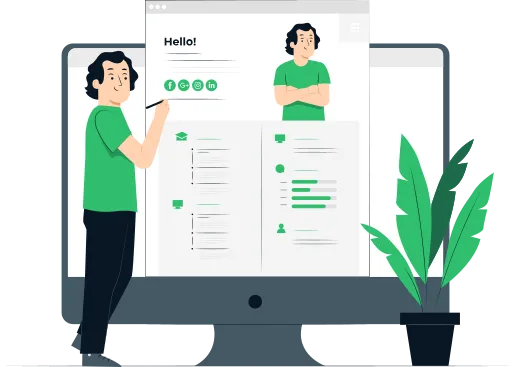
Build your Resume in 15 minutes
Create an awesome resume that meets the expectations of potential employers with our selection of professional, field-tested resume templates.

